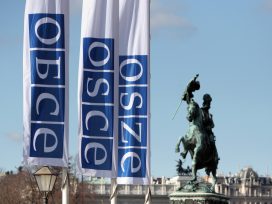Democratic, can travel
Russia’s authoritarian regime owes its tenacity to the reversal of two central communist precepts, writes Ivan Krastev. First, its abandonment of the ideology of public interest prevents it being measured against its own standards. Second, its policy of open borders diffuses protest potential from a dissatisfied middle class.
In her famous November 1979 article in Commentary, “Dictatorships and Double Standards,” Jeane Kirkpatrick argued that totalitarian regimes grounded in revolutionary ideology are not only more repressive than traditional authoritarian regimes but are much harder to liberalize or democratize. In her view, ideology is a source of transcendental legitimacy for these regimes, giving them some of the qualities of theocracies.
Ideology also served as a means of securing the ruling elite’s coherence. The notion of “the correct party line,” as Ken Jowitt has argued, did for Leninist regimes what democratic procedures had done in the West. The existence of a ruling party rooted in an ideology was vital to solving the problem of succession, the most dangerous source of instability in autocratic regimes. The ruling ideology also served as a tool for political mobilization. As the history of the Soviet Union shows, it was sometimes easier to die for the regime than to live under it. The heroism of the Soviet people during World War II provided the ultimate demonstration of the power of the ideological authoritarians.
The notion of ideology as a source of strength for autocratic regimes is so much a part of the Cold War’s legacy in the West that one is surprised to encounter the post-Soviet elite’s view of communist ideology as one of the old regime’s weaknesses. The USSR’s collapse showed that ideology corrodes autocratic regimes in two ways: it feeds the reformist delusions of the elite, and it gives the regime’s opponents a language and a platform by holding up an ideal against which the regime can be measured and found wanting.
During the last twenty years, thousands of books have been published on the nature of Mikhail Gorbachev’s revolution. But for my argument, the key point is that Gorbachev started his reforms not because he had lost faith in communism, but because he remained a true believer, who was firmly convinced that the genuine socialism he hoped to install would prove itself decisively superior to the democratic capitalism of the West. Reforms from above often are generated by rulers’ misperceptions; not their accurate grasp of reality.
Ideology not only breeds reformist delusions on the part of elites, it also gives the opposition a discourse that it can use to press the regime from below. As a rule, dissidents in the Soviet bloc were former believers; before opposing Marxist regimes root and branch, they had often criticized these regimes in the language of Marxism itself. One cannot fully understand the power of the Prague Spring or of Solidarity’s “self-limiting revolution” without understanding the self-consciously “dialectical” nature of these movements. The revolutions of 1989 were the joint product of communist elites who contributed to the demise of their own regimes by genuinely trying to reform them and of oppositionists who fuelled the regimes’ demise by pretending to want reform when in reality they had come to desire complete uprooting.
Resisting Putin’s regime is so difficult precisely because of its lack of any ideology beyond a meaningless melange of Kremlin-produced sound bites. Public relations experts are not fit for the role of ideologues because an ideology, unlike an ad campaign, is something in which its authors must believe. The new authoritarian regimes’ lack of any real ideology explains their tendency to view themselves as corporations. In order to stay in power, they try to eradicate the very idea of the public interest. In this context, the glorification of the market does not undermine the new authoritarian capitalism; it can even strengthen it. If the public interest is nothing more than the unintended outcome of millions of individuals pursuing their private interests, then any sacrifice in the name of the public interest is a waste.
The new authoritarian regimes’ lack of any ideology also partly explains why the democratic world is reluctant to confront them. They do not seek to export their political models, and hence they are not threatening. The new authoritarian regimes do not want to transform the world or to impose their system on other countries. So the axis of conflict today is no longer the free world versus the world of authoritarianism – it is rather the free world versus the world of free riding.
Also lurking behind the belief that authoritarianism is doomed to the slow death of reform or the sudden death of collapse is the assumption that the opening of borders must be fatal to autocracy. In the middle of the nineteenth century, Adolphe de Custine, the French aristocrat who went to Russia in 1839 looking for arguments to support his conservatism and came back as an advocate of constitutionalism, had already claimed that “the political system of Russia could not withstand twenty years of free communication with western Europe”. His proposition is a common belief today: open borders allow people to see a different way of life and to struggle to achieve it, thus encouraging demands for change. Open borders also make it easier for people to organize with help from abroad.
But do open borders really destabilize authoritarian regimes? Joseph Stalin, of course, very much believed so. He sent to the gulag millions of Soviet soldiers whose only crime was that they had seen western or even central Europe. But Putin is not Stalin. He does not try to govern Russia by preventing people from travelling; he governs it by allowing them to travel. While open borders place some limits on a government’s ability to manipulate and persecute, they also afford opportunities to promote the survival of the regime.
Almost forty years ago, economist Albert O. Hirschman, in his brilliant little book Exit, Voice, and Loyalty, explained why railways in Nigeria had performed so poorly in the face of competition from trucks and buses. In his view, consumers, such as the customers of the Nigerian railways or members of organizations, can offer two opposing responses to the deterioration of the goods they buy or the services they receive. The first is exit – simply the act of leaving, such as buying another shampoo, resigning from the party, or departing from the country. Voice, by contrast, is an act of complaining or protesting. As Hirschman points out, however, the easy availability of exit, like the easy availability of trucks and buses in the Nigerian case, tends to diminish the use of voice, because exit requires less time and commitment.
Exit is particularly attractive for middle-class Russians who have managed to become consumers and at the same time are discouraged about the potential for collective action. Russia’s demographic situation – its aging and shrinking populace – and weak national identity have made exit a very natural option for those who are disappointed with the regime. The emergence of an exit-minded middle class in Russia is at the heart of the regime’s survival capacity. The Russian economist Leonid Grigoriev recently suggested that more than “two million Russian democrats have left the country in the last decade”. Voting with one’s feet by leaving Russia because it is undemocratic is not the same as voting to make Russia democratic.
In fact, Hirschman’s explanation may be the key to understanding why it is so difficult to resist Putin’s authoritarianism. It explains the failure of reforms and the resulting loss of the reformist spirit in Russia. Paradoxically, the opening of the borders and the opportunity to live and work abroad have led to the decline of political reformism. The people who are most likely to be upset by the poor quality of governance in Russia are the very same people who are the most ready and able to leave. For them, changing the country in which they live is easier than reforming it. Why try to turn Russia into Germany, when there is no guarantee that a lifetime is long enough for that mission, and when Germany is but a short trip away? The opinion polls demonstrate that Russia’s middle class prefers to work abroad and to come home to Russia during the holidays to see their friends and relatives.
Comparing the outburst of reformist energy in the 1980s with the lack of such energy today leads me to believe that, while the sealing of the borders destroyed Soviet communism, the opening of the borders helps the new Russian authoritarianism to survive. The Soviet system locked its citizens in. Changing the system was the only way to change your life. Today’s Russia, on the other hand, very much resembles the Nigerian railways – it will remain inefficient as long as there is enough oil money to compensate for its inefficiency. The major reason why Russians are reluctant to protest is not fear; it is because the people who care most have already left the country or have resolved to do so in the near future – or they may simply have moved to the virtual reality of the Internet (Russians on average spend twice as much time using online social networks as their western counterparts). The consequence is that there is no critical mass of people demanding change.
Where will all this lead? It is not easy to predict. But I would say that the future of dysfunctional authoritarian regimes like the one we see in Russia today is less likely to eventuate in democracy than in decay. It is not “after Putin, the deluge”, but “after Putin, the dry rot”.
This article is based on the Seymour Martin Lipset Lecture on Democracy in the World, delivered by Ivan Krastev in Washington D.C. on 19 October 2010.
Published 17 March 2011
Original in English
First published by IWM Post September/December 2010
Contributed by Transit © Ivan Krastev / IWM / Eurozine
PDF/PRINTPublished in
In collaboration with
Newsletter
Subscribe to know what’s worth thinking about.
Related Articles

From Helsinki to full-scale invasion
Russia, European security and the OSCE
Russia’s invasion of Ukraine, and its denial of rights at home, are precisely the kind of development that the Organization for Security and Co-operation in Europe was set up to prevent. So why has the OSCE failed to fulfil its purpose?

Two opposing interpretations of 1945 form the ideological core of today’s confrontation between Russia and the states of central and eastern Europe. Both are reactions to the collapse of the Cold War order.





